Cats and chewing - an unlikely pair, you might think. However, contrary to popular belief, our kitty companions can be as chew-happy as their canine counterparts. From shoes to cords to, yes, even your hair, cats can develop an alarming knack for chewing. Is your pet turning into a pint-sized paper shredder or hair gnawer? Ever wondered why they have this peculiar habit or, more importantly, how you can stop problem chewing in cats?
We will explain the reasons behind this seemingly destructive chewing. We'll discuss how it's not just a dog's prerogative, why kittens chew, why adult cats continue to chew, and when it can become a genuine concern for your pet's health and safety. We'll also address the frustrations you might be facing as a pet owner - those chewed-up remote controls, mangled shoe straps, or tender, gnawed fingers.
Get ready for some insightful, practical steps to protect your belongings and your pet, ensuring harmony in your home.
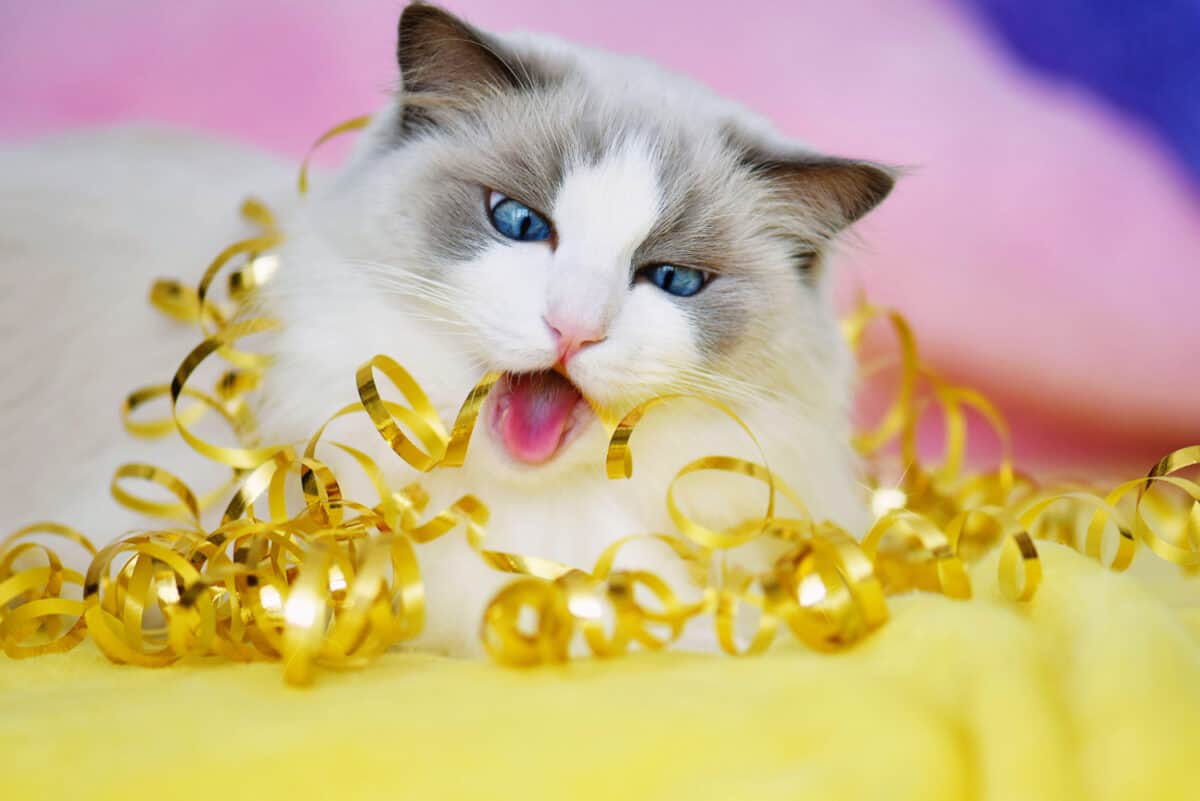
Kittens And Their Fascination With Chewing: Not Just A Canine Conundrum
Chewing can become a concerning behavior among our little kittens. In certain instances, this chewing fascination matures into an adult habit, serving as a means of stress relief. Equipped with smaller mouths than their doggy counterparts, cats usually set their sights on smaller chewable treasures.
Sure, shoes remain in their repertoire, but the approach differs slightly. Cats tend to exhibit a slow, methodical gnawing style, often fixating on a specific spot like a tempting shoe strap. Electrical cords also find their way into their chewing catalog, as does cardboard, with some cats transforming into dedicated shredders.
Then there's the enthralling allure of human fingers for numerous kittens, seemingly irresistible chew toys. And let's not forget those hair-chewing kittens! Perhaps a hair strand's texture or the intimate bond with their human makes it an ideal target for these chew-happy critters. The kitten world, it seems, is a playground filled with potential chewables!
Why do cats chew on things?
Kittens often chew to relieve the pain and discomfort of teething. As their first teeth grow, fall out, and are replaced with permanent teeth, kittens are likely to seek out objects to munch on. This can become a habit and the cat can keep on chewing as an adult, long after the permanent teeth have fully grown in.
Chewing seems to provide some cats with stress relief, especially if the stress is related to boredom. In other words, a cat with too much energy and not enough stimuli can resort to chewing to relieve the stress. That said, it's always a good idea to ask your vet about your cat's chewing habits. He or she will check the cat's mouth and teeth, to make sure there is nothing that causes them physical discomfort.
SIGN UP FOR THECATSITE'S EMAIL UPDATES >
Why stop my cat from chewing on things?
If done excessively, chewing can gradually erode the surface of the cat's teeth. A more pressing concern is safety: chewing on electric cords can be very dangerous. Some items may be toxic, or break apart with small parts being ingested by the cat.
Many owners complain about the damage caused by inappropriate chewing.
They chew on the remotes for our TVs while we use them and when they're just on the bed. They chewed through the cord on our $180 heating blanket.
Other owners want to stop their cats from gnawing on their fingers. It certainly can be painful!
While it can be tolerated with young kittens, inappropriate chewing often turns into a behavior problem with adult cats.
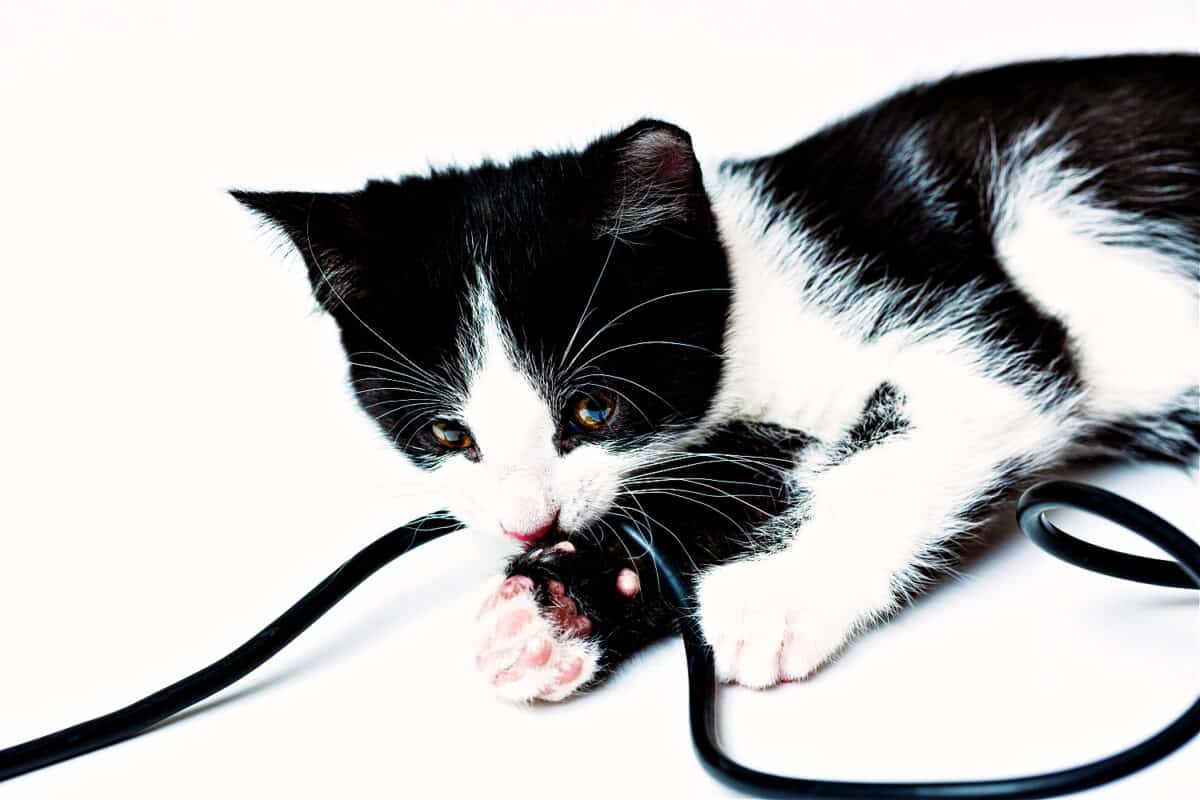
How To Stop Inappropriate Chewing In Cats
Ensure Safety And Identify Motivation
The first step in addressing inappropriate chewing is to prioritize safety. Identify any objects that pose an immediate danger, such as electric cords, toxic plants, or items that could splinter and harm your cat. Keep these objects out of your cat's reach to prevent accidents.
Next, understand the motivation behind your cat's chewing behavior. For kittens, chewing is a natural part of the teething process. Provide appropriate chew toys to satisfy their need to chew and protect your belongings.
Re-Directing Chewing Behavior
If you notice excessive or destructive chewing in adult cats, try these strategies to re-direct their behavior to more acceptable outlets:
Engage In Interactive Playtime
Engage your cat with interactive playtime at least once a day. This keeps your cats from getting bored and lowers stress levels.
Read more: Playing With Your Cat: 10 Things You Need To Know
Experiment With Food
Try switching the type of food or adding treats to your cat's diet. Some cats like the added crunch of dry food while others may enjoy chewy treats like these:
See These Freeze Dried High Protein Cat Treats
See These Freeze Dried Cat Treats On Amazon
Create A Kitty Garden
Add some natural grass to your cat's diet by planting a little Kitty garden. This can both alleviate boredom and provide an extra crunch.
Read more: 9 Grass Growing Kits That Will Make Your Cat Happy
Provide An Enriched Environment
Keep Kitty from getting bored by creating an environment for your cat which encourages exercise and play.
Read more: Beating Boredom - What Indoor Cat Owners Need To Know
Manage Stress
If your cat's chewing behavior became more frequent or intense, look into potential stressors and stress management techniques.
Read more: Stress in Cats - the Ultimate Guide
Offer Alternatives
Offer alternatives, especially if your cat is young and could still be experiencing the growing pains of teething. You can try safe homemade alternatives, such as cardboard, or invest in appropriate chew toys for cats:
Find This Kitten Teether On Amazon
See These Catnip Chew Toys On Amazon
Buy This Dental Health Chews Pair On Amazon
See This Pretzel Cat Chew On Amazon
Remember, each cat is unique, and finding the right solution may require some trial and error. If the chewing behavior persists or worsens, consult with your veterinarian or a professional behaviorist for further guidance.
Recap: How To Stop Problem Chewing In Cats
Contrary to popular belief, chewing is not just a canine conundrum. Kittens and adult cats alike can develop a fascination with nibbling on various objects, causing frustration for their owners.
We explored the reasons behind this behavior, discovering that chewing serves different purposes for kittens and adult cats. Kittens often chew to alleviate the discomfort of teething, while adult cats may chew as a means of stress relief or out of boredom.
Understanding the motivations behind your cat's chewing behavior is crucial in addressing the issue. We discussed the importance of ensuring safety by removing dangerous objects from their reach and identifying appropriate chew toys.
Additionally, we provided practical strategies to redirect their chewing behavior, such as engaging in interactive playtime, experimenting with different types of food or treats, creating an enriched environment, managing stress, and offering alternatives.
Remember, each cat is unique, so finding the right solution may require some trial and error. If your cat's chewing behavior persists or worsens, it's always a good idea to seek guidance from a veterinarian or professional behaviorist.
By implementing these strategies and maintaining a safe environment, you can help your furry friend overcome problem chewing and ensure harmony in your home.
SIGN UP FOR THECATSITE'S EMAIL UPDATES >
Need more help with destructive chewing behavior? Why not start a thread about it in the Cat Behavior forum?
Note: We may get commissions for purchases made through links on this page.







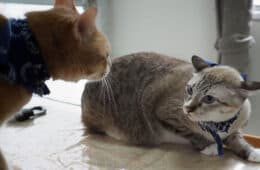
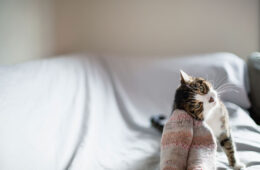
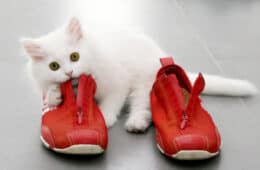
9 comments on “How To Stop Problem Chewing In Cats”